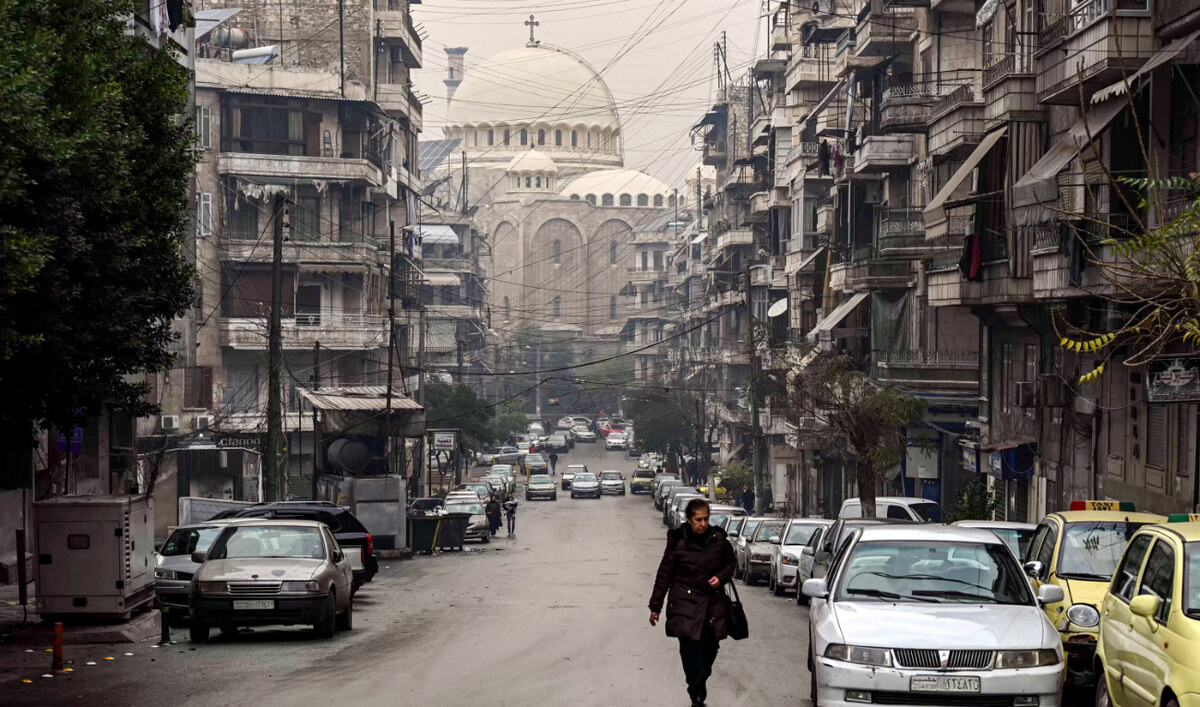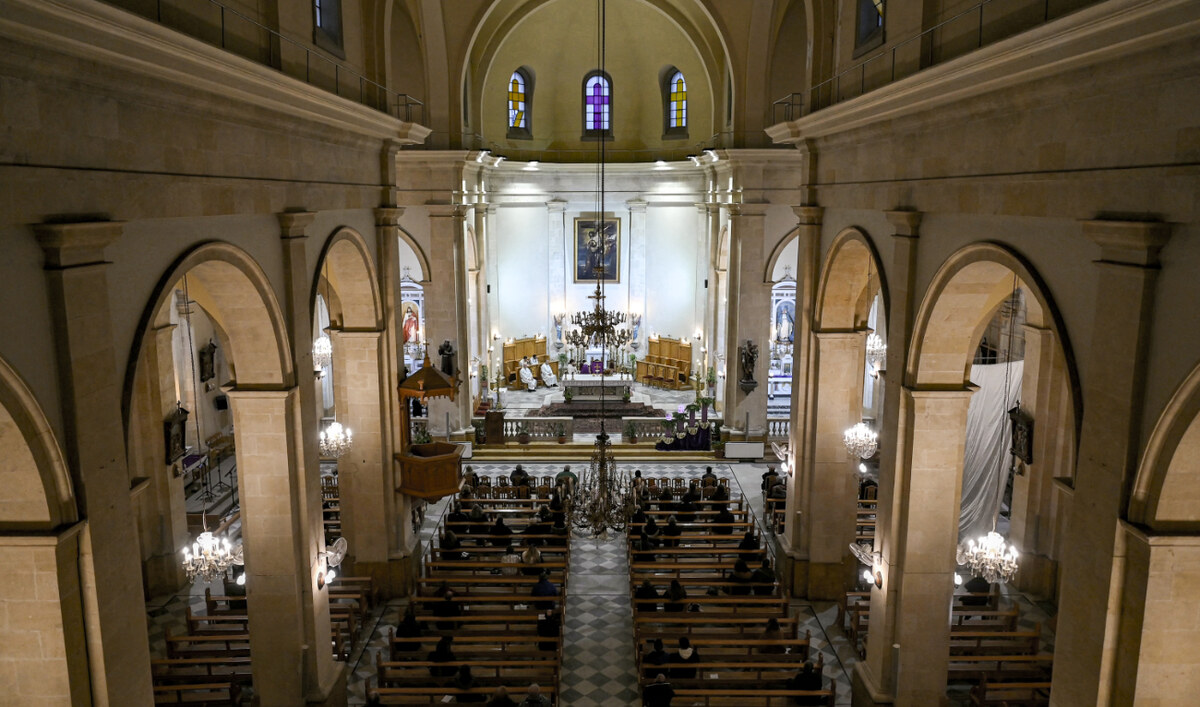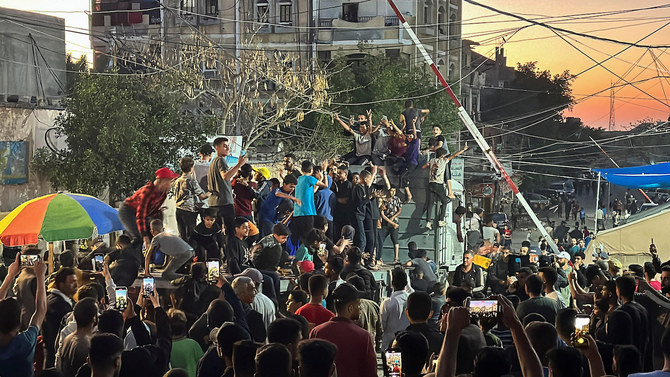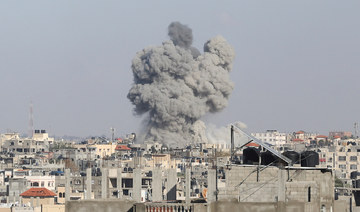JERUSALEM: Hamas announced its acceptance Monday of an Egyptian-Qatari ceasefire proposal, but Israel said the deal did not meet its “core demands” and that it was pushing ahead with an assault on the southern Gaza town of Rafah. Still, Israel said it would continue negotiations.
The high-stakes diplomatic moves and military brinkmanship left a glimmer of hope alive — but only barely — for an accord that could bring at least a pause in the 7-month-old war that has devastated the Gaza Strip. Hanging over the wrangling was the threat of an all-out Israeli assault on Rafah, a move the United States strongly opposes and that aid groups warn will be disastrous for some 1.4 million Palestinians taking refuge there.
Hamas’s abrupt acceptance of the ceasefire deal came hours after Israel ordered an evacuation of some 100,000 Palestinians from eastern neighborhoods of Rafah, signaling an invasion was imminent.
Israel’s War Cabinet decided to continue the Rafah operation, Prime Minister Benjamin Netanyahu’s office said. At the same time, it said that while the proposal Hamas agreed to “is far from meeting Israel’s core demands,” it would send negotiators to Egypt to work on a deal.
The Israeli military said it was conducting “targeted strikes” against Hamas in eastern Rafah. The nature of the strikes was not immediately known, but the move appeared aimed at keeping the pressure on as talks continue.
President Joe Biden spoke with Prime Minister Benjamin Netanyahu and reiterated US concerns about an invasion of Rafah. US State Department spokesman Matthew Miller said American officials were reviewing the Hamas response “and discussing it with our partners in the region.” An American official said the US was examining whether what Hamas agreed to was the version signed off to by Israel and international negotiators or something else.
It was not immediately known if the proposal Hamas agreed to was substantially different from one that US Secretary of State Antony Blinken pressed the militant group to accept last week, which Blinken said included significant Israeli concessions.
Egyptian officials said that proposal called for a ceasefire of multiple stages starting with a limited hostage release and partial Israeli troop pullbacks within Gaza. The two sides would also negotiate a “permanent calm” that would lead to a full hostage release and greater Israeli withdrawal out of the territory, they said.
Hamas sought clearer guarantees for its key demand of an end to the war and complete Israeli withdrawal in return for the release of all hostages, but it wasn’t clear if any changes were made.
Israeli leaders have repeatedly rejected that trade-off, vowing to keep up their campaign until Hamas is destroyed after its Oct. 7 attack on Israel that triggered the war.
Netanyahu is under pressure from hard-line partners in his coalition who demand an attack on Rafah and could collapse his government if he signs onto a deal. But he also faces pressure from the families of hostages to reach a deal for their release.
Thousands of Israelis rallied around the country Monday night calling for an immediate agreement. About a thousand protesters swelled near the defense headquarters in Tel Aviv, where police tried to clear the road. In Jerusalem, about a hundred protesters marched toward Netanyahu’s residence with a banner reading, “The blood is on your hands.”
Israel says Rafah is the last significant Hamas stronghold in Gaza, and Netanyahu said Monday that the offensive against the town was vital to ensuring the militants can’t rebuild their military capabilities.
But he faces strong American opposition. Miller said Monday the US has not seen a credible and implementable plan to protect Palestinian civilians. “We cannot support an operation in Rafah as it is currently envisioned,” he said.
The looming operation has raised global alarm. Aid agencies have warned that an offensive will bring a surge of more civilian deaths in an Israeli campaign that has already killed 34,000 people and devastated the territory. It could also wreck the humanitarian aid operation based out of Rafah that is keeping Palestinians across the Gaza Strip alive, they say.
UN High Commissioner for Human Rights Volker Türk on Monday called the evacuation order “inhumane.”
“Gazans continue to be hit with bombs, disease, and even famine. And today, they have been told that they must relocate yet again,” he said. “It will only expose them to more danger and misery.”
Israeli leaflets, text messages and radio broadcasts ordered Palestinians to evacuate eastern neighborhoods of Rafah, warning that an attack was imminent and anyone who stays “puts themselves and their family members in danger.”
The military told people to move to an Israel-declared humanitarian zone called Muwasi, a makeshift camp on the coast. It said Israel has expanded the size of the zone and that it included tents, food, water and field hospitals.
It wasn’t immediately clear, however, if that was already in place.
Around 450,000 displaced Palestinians already are sheltering in Muwasi. The UN agency for Palestinian refugees, known as UNRWA, said it has been providing them with aid. But conditions are squalid, with few sanitation facilities in the largely rural area, forcing families to dig private latrines.
Jan Egeland, secretary-general of the Norwegian Refugee Council, condemned the “forced, unlawful” evacuation order to Muwasi.
“The area is already overstretched and devoid of vital services,” Egeland said.
The evacuation order left Palestinians in Rafah wrestling with having to uproot their families once again for an unknown fate, exhausted after months living in sprawling tent camps or crammed into schools or other shelters in and around the city. Israeli airstrikes on Rafah early Monday killed 22 people, including children and two infants.
Mohammed Jindiyah said that at the beginning of the war, he tried to hold out in his home in northern Gaza under heavy bombardment before fleeing to Rafah.
He is complying with Israel’s evacuation order this time, but was unsure whether to move to Muwasi or elsewhere.
“We are 12 families, and we don’t know where to go. There is no safe area in Gaza,” he said.
Sahar Abu Nahel, who fled to Rafah with 20 family members, including her children and grandchildren, wiped tears from her cheeks, despairing at a new move.
“I have no money or anything. I am seriously tired, as are the children,” she said. “Maybe it’s more honorable for us to die. We are being humiliated.”
Israel’s bombardment and ground offensives in Gaza have killed more than 34,700 Palestinians, around two-thirds of them children and women, according to Gaza health officials. The tally doesn’t distinguish between civilians and combatants. More than 80 percent of the population of 2.3 million have been driven from their homes, and hundreds of thousands in the north are on the brink of famine, according to the UN
The war was sparked by the unprecedented Oct. 7 raid into southern Israel in which Palestinian militants killed around 1,200 people, mostly civilians, and abducted some 250 hostages. After exchanges during a November ceasefire, Hamas is believed to still hold about 100 Israelis as well the bodies of around 30 others.
Hamas accepts Gaza ceasefire; Israel says it will continue talks but launches strikes in Rafah
https://arab.news/z9e2k
Hamas accepts Gaza ceasefire; Israel says it will continue talks but launches strikes in Rafah

- Uncertain whether a deal had been sealed to bring a halt to the seven-month war in Gaza
- Palestinians in Rafah celebrated after announcement, hoping it meant the invasion would be averted
Turkish military kills 21 Kurdish militants in northern Syria and Iraq, ministry says

- Turkiye regards the YPG, the leading force within the US-backed Syrian Democratic Forces (SDF), as an extension of the PKK and similarly classifies it as a terrorist group
ANKARA: The Turkish military killed 21 Kurdish militants in northern Syria and Iraq, the defense ministry said on Wednesday.
In a statement, the ministry reported that 20 Kurdistan Workers Party (PKK) and Syrian Kurdish YPG militants, who were preparing to launch an attack, were killed in northern Syria, while one militant was killed in northern Iraq.
“Our operations will continue effectively and resolutely,” the ministry added.
The PKK, designated as a terrorist organization by Turkiye, the European Union, and the United States, began its armed insurgency against the Turkish state in 1984. The conflict has claimed more than 40,000 lives.
Turkiye regards the YPG, the leading force within the US-backed Syrian Democratic Forces (SDF), as an extension of the PKK and similarly classifies it as a terrorist group.
Following the fall of Syrian President Bashar Assad earlier this month, Ankara has repeatedly insisted that the YPG must disband, asserting that the group has no place in Syria’s future.
The operations on Wednesday come amid ongoing hostilities in northeastern Syria between Turkiye-backed Syrian factions and the YPG.
Ankara routinely conducts cross-border airstrikes and military operations targeting the PKK, which maintains bases in the mountainous regions of northern Iraq.
Turkiye court jails hotel owner, architect in quake trial

The dead included 26 members of a school volleyball team from northern Cyprus. The Grand Isias Hotel in Adiyaman crumbled after the February 2023 quake that claimed 55,000 lives in Turkiye.
The court in Adiyaman sentenced hotel owner Ahmet Bozkurt to 18 years and five months in prison for “causing the death or injury of more than one person through conscious negligence,” the official Anadolu news agency reported.
His son Mehmet Fatih Bozkurt was sentenced to 17 years and four months in jail and architect Erdem Yilmaz got 18 years and five months on the same charges, Anadolu added.
An AFP team saw the hotel completely flattened.
The regional government declared a national mobilization, hiring a private plane to join a search-and-rescue effort for the volleyball team members.
Speaking to reporters after the court’s verdict, Turkish Cypriot Prime Minister Unal Ustel said the sentences were too lenient and they would take the case to a higher court.
“Hotel owners did not get the punishment we had expected,” Ustel said. “But despite that, everyone from those responsible in the hotel’s construction to the architect was sentenced. That made us partially happy.”
The collapse of the hotel sparked harsh criticism of the government for allowing the construction of a building without the necessary permits.
Syria’s Christians mark Christmas amid political change and uncertainty

- Religious minorities in Syria are wary of their new rulers and their rights under a post-Assad constitution
- Christmas celebrations remain subdued amid economic hardship, fuel shortages and power outages
DUBAI: For Father Iyad Ghanem, a Catholic priest at the Syriac Archdiocese of Homs and Hama, two of Syria’s four largest cities, this Christmas represents both new beginnings and the end of a dark chapter in Syria’s history.
In the wake of the dramatic developments that led to the ousting of Syria’s long-time President Bashar Assad on Dec. 8, Christians in the country are celebrating Christmas under the transitional government of Hayat Tahrir Al-Sham (HTS) for the first time.
HTS, a rebel group led by Ahmad Al-Sharaa, Syria’s de facto leader, has sought to reassure minority communities, including Kurds, Alawites and Shiites, as it distances itself from its hardline Islamist roots. For many Christians, the end of the Assad era has come as a veritable Christmas gift.
“Our churches are at peace, and we, as clergymen, are free to conduct our masses. Yet, it is too early for the parish to pass judgment on HTS. The atmosphere remains uncertain, and much is left to unfold,” Father Iyad told Arab News.
“Our country and community have endured so much over the past 13 years. With this new era upon us, we must free ourselves from fear, find the voices that were silenced for so long, and eliminate radicalism in all its forms. This is all unfamiliar territory, and we are still adjusting.”

Syria is part of a region often referred to as the “cradle of Christianity,” making it one of the earliest places in the world to host a Christian community. In the town of Maaloula, a handful of villages still speak Aramaic, the ancient dialect of Christ, to this day.
Once numbering over a million, Syria’s Christian population has dwindled to just 3 percent owing to the prolonged war that began in 2011 and the rise of Daesh in 2014. The violence and persecution left them vulnerable, forcing a large-scale exodus to Western countries.
Rassem Sairafi, a Christian from Homs, said he is optimistic about Syria’s future and hopes for a democratic and free nation.
“Many educated Syrians are returning from abroad. If they are included in the new government, I believe we will be in safe hands,” he told Arab News.
“Historically, Syria’s Sunni majority has been moderate. It was only during the war that began in 2011 that sectarianism took root. Hopefully, we can leave that behind and ensure we do not replace one dictatorship with another.”
The Assad regime left Syria in ruins. Its legacy is starkly evident in decimated infrastructure, a deeply entrenched corrupt political system, and a bankrupt economy that has pushed 90 percent of the population below the poverty line.
In a report for the US public broadcaster PBS on Dec. 12, correspondent Simona Foltyn said: “Streets are getting busier by the day and shops and government institutions are slowly returning to work.
“The opposition has taken over government institutions in the capital, Damascus, and has begun the task of governing the country, using its experience in Idlib as a blueprint. But administrating a whole country, as opposed to a province, is quite a different matter, and it remains to be seen how easily it can be scaled.”
She added: “Apart from the joy and relief, the mundane but vital work of making a country function is job number one for many.”

With Assad’s fall, Christians face additional uncertainty as a religious minority about their fate under the country’s new rulers. They feel that their future hangs in the delicate balance of a new era and constitution.
The Christian community, like all Syrians, endured severe hardships under Assad’s regime and so regards the new government with a mix of caution and optimism.
“We are nervous because we are unsure. We do not know what the future holds,” said Rawaa, a Christian from Damascus. “But we are aware of HTS’s history. While their recent legislative decisions are comforting, we remain eager to see if they will uphold these commitments over time.”
Despite being hailed as Syria’s “liberators” and Al-Sharaa’s recent efforts to rebrand himself — shedding his military persona as Abu Mohamad Al-Jolani to adopt the image of a statesman — the country’s stability and economic recovery remain precarious.
HTS is still designated as a terrorist group by the UN, US, EU, and UK, among many others, as it started as a splinter group of Al-Qaeda, which it broke away from in 2016.

Once confined to the overcrowded and impoverished northwestern region of Idlib but now acting as the self-imposed caretaker government in Damascus, HTS faces the daunting challenge of rebuilding a nation devastated by years of corruption and mismanagement under Assad.
In an effort to stave off chaos, Al-Sharaa has taken steps to restore basic services in some areas, called for the preservation of state institutions, and promoted the vision of an inclusive society and a peaceful transition to new governance.
Senior leaders of the transitional government continue to meet with representatives of various religious communities, emphasizing their commitment to protecting minority rights as part of broader efforts to reassure both Syrians and the international community.
Both Father Iyad and Rawaa voiced their aversion to the use of the term “minority” when describing their community, insisting they are an integral part of Syria’s fabric and one of the essential components that define the country.
This year, across various parts of the country, only churches have adorned their doors and squares with Christmas decorations — a gesture that Rawaa interprets as a sign of hope for the future. However, celebrations remain subdued. Many, including Rawaa’s family and friends, are opting for private gatherings.

“My neighborhood hasn’t put up Christmas decorations since the war began 13 years ago, and this year is no different,” Rawaa told Arab News.
“But it’s not out of fear of HTS. It’s because of the shortages we face and the hardships we endure. We lack electricity, fuel, and financial resources. The population is struggling, and the festive spirit is hard to find in such conditions.”
“Our celebrations will be within our homes, with close family and friends,” Rawaa said. “This is a new experience for us. While there has been no persecution from HTS, we are proceeding cautiously. The transitional government has promised to launch awareness campaigns to combat radicalism if necessary. Time will tell if they fulfill that promise.”
Mary Bitar, a Christian from Damascus, saw reason for optimism amid the adversities in the lead-up to Christmas.
“People are out and about. No one is being harassed. We may lack Christmas lights because of the electricity shortages, but our hearts are full, and we remain hopeful,” she said.

In his comments, Father Iyad emphasized that isolated acts of terrorism must be addressed before they escalate, citing a recent incident in Hama where armed men desecrated a Christian graveyard and set crosses in town squares ablaze.
“Small factions that align themselves with HTS must be controlled,” he told Arab News. “Those seeking to sow chaos must be stopped. We will not tolerate any radicalized behavior.”
Despite these challenges, Father Iyad remains steadfast in his message of hope. “My wish is for unity — a just legislation that provides equal rights to all Syrians. A peaceful, beautiful Syria for everyone.”

Gaza Christians pray for end of ‘death and destruction’

- Gone are the sparkling lights, festive decorations and towering Christmas tree that had graced Gaza City for decades
- Square of Unknown Soldier, once alive with spirit of the season, now lay in ruins, reduced to rubble by Israeli air strikes
GAZA CITY: Hundreds of Christians in war-ravaged Gaza City gathered at a church on Tuesday, praying for an end to the war that has devastated much of the Palestinian territory.
Gone were the sparkling lights, the festive decorations, and the towering Christmas tree that had graced Gaza City for decades.
The Square of the Unknown Soldier, once alive with the spirit of the season, now lay in ruins, reduced to rubble by relentless Israeli air strikes.
Amid the rubble, the faithful sought solace even as fighting continued to rage across the coastal strip on Tuesday.
“This Christmas carries the stench of death and destruction,” said George Al-Sayegh, who for weeks has sought refuge in the 12th century Greek Orthodox Church of Saint Porphyrius.
“There is no joy, no festive spirit. We don’t even know who will survive until the next holiday.”
A part of the church itself was destroyed in an Israeli air strike in October last year, in which 18 Palestinian Christians were killed, according to the territory’s health ministry.
About 1,100 Christians live in Gaza, a community that has also faced the brunt of the war since October 7 last year, when fighting between Israel and Hamas broke out.
Israel’s recent air strikes, including one that killed several children according to the territory’s civil defense agency, have come under severe criticism from Pope Francis.
“With pain I think of Gaza, of so much cruelty, of the children being machine-gunned, of the bombings of schools and hospitals. What cruelty,” the pope said after his weekly Angelus prayer on Sunday.
Israeli Foreign Minister Gideon Saar had slammed the pontiff’s comment, saying they showed “double standards.”
But the pain and sorrow are visible in Gaza, and for Gaza City resident Kamal Jamil Caesar Anton, the festive season of Christmas is marred by profound grief.
Last December, his wife Nahida and daughter Samar were killed by Israeli sniper fire within the compound of the Holy Family Church, he said.
“We pray for peace, for the war to end so that the people can live safely,” Anton said.
His sentiments were echoed by resident Ramez Al-Souri who also suffered a bitter tragedy during the air strike that hit the Church of Saint Porphyrius.
His three children were among those killed in that attack.
“We are still suffering. We didn’t celebrate last year because of the destruction,” Souri said.
“This year we hoped for an end to the war, but every day we lose loved ones.”
Local Christian community leader George Anton hoped the warring sides would end the fighting soon.
“We call on all parties to end the war and to seek a true path to peace,” he said.
“We hope both peoples can live in harmony and security.”













